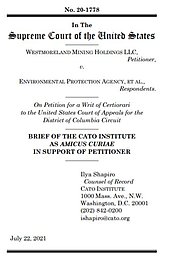In 2009, the House of Representatives passed a “cap-and-trade” policy to fight global warming, but the bill died on the vine in the Senate. So, President Obama ordered the EPA to do what Congress wouldn’t, and the agency promulgated the Clean Power Plan, which was designed to restructure the electricity grid through “generation shifting.” For compliance, the EPA proposed to operate nationwide “model trading rules,” also known as a cap-and-trade; the agency “expected” states to participate. The upshot is that the EPA’s Clean Power Plan entailed the same major policy—a nationwide cap-and-trade to reorder energy production—that the 111th Congress had declined to adopt after much deliberation.
On its face, the Clean Power Plan contravenes common sense. After all, how is it that a regulatory agency can achieve the same major policy that Congress rejected? The rule also flies in the face of the Supreme Court’s relevant decisions. In a prior case involving the EPA’s authority to fight climate change, the Court said that it “expects Congress to speak clearly” when conferring significant regulatory power. The Clean Power Plan, by contrast, was based on a vague and rarely used “catchall” provision of the Clean Air Act.
Still, in a split 2 – 1 decision last January, the D.C. Circuit found “ample discretion” in the “gaps” of the Clean Air Act to authorize a nationwide cap-and-trade for the electricity grid. Where the Supreme Court adopted a cautious approach, the D.C. Circuit threw caution to the wind. Already, the Biden administration has indicated its preference for the D.C. Circuit’s expansive reading of the EPA’s power. As a result, the agency is poised to (again) spend years working on a major climate policy that is indistinguishable from failed legislation.
Various states and industries have petitioned the Supreme Court to review the D.C. Circuit’s decision. Today, the Cato Institute filed a brief in support of the petitioners. We urge the Court to harmonize the judiciary’s guidance to the EPA, and thereby avoid a massive waste of public resources.



